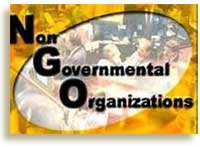NON GOVERNMENTAL ORGANIZATIONS
Introduction to the Career
NGO, or a non governmental organization, is a body recognized by the legal constitution of a country but is been managed by an individual or a group of persons working independently with the control of the government. The term 'non governmental organization' was coined by the United Nations long time ago and has been in use to describe any association that is run by a private group of individuals which does not have the motive for the business as profit in mind while contributing to the good of the society.

An NGO is started mainly to contribute and to fulfill certain stated social aims. But today, as the NGO's are growing in size and gaining popularity among the masses, it also gets monetary help from different political parties and takes on a political color. But there has been a clear difference between the terms non governmental organizations and intergovernmental organizations.
Career Qualifications
With the advent of professional courses in different colleges in India, a career in a NGO has evolved as one of the chosen career options in the country. There have been different types of NGOs operating in mainly different Indian cities and working in these organizations will not only give one the social recognition but will also bring one closer to humanity and life in general.

Traditionally, no specific educational qualifications were necessary before some time for pursuing a career in a non governmental organization. In fact, several people became involved with a NGO out of sheer love for serving humanity, while also pursuing a full fledged career in some other field of work. Today, due to the rise of NGOs in the country and with more investments being made in a non governmental organization, people are more interested to pursue a career with one of the reputed NGOs in their towns or cities and in other places across the country.
Some of the qualifications to pursue the career in NGO are:
- Bachelor Degree
- A degree or certificate course in PR and Management
- A certificate course in TESOL (Teaching English to Speakers of Other Languages)
- Course in NGO Management is an added advantage
- A general awareness of all the administration, global events and issues, community development and information management
- A certificate course or MBA in Finance and Human Resources
Institutes for Training a Career in NGOs
Non Governmental Organizations |
Therefore mere academic qualifications are not enough for building a successful career in non governmental organizations.
